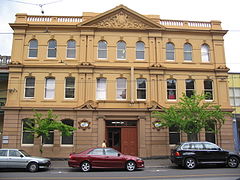
The Moody Blues are a rock band formed in Birmingham, England in 1964, initially consisting of keyboardist Mike Pinder, multi-instrumentalist Ray Thomas, guitarist Denny Laine, drummer Graeme Edge, and bassist Clint Warwick. The group came to prominence playing rhythm and blues music. They made some changes in musicians but settled on a line-up of Pinder, Thomas, Edge, guitarist Justin Hayward, and bassist John Lodge, who stayed together for most of the band's "classic era" into the early 1970s.

Brunswick is an inner-city suburb of Melbourne, Victoria, Australia, 6 kilometres (3.7 mi) north of Melbourne's central business district. Its local government area is the City of Moreland. At the 2016 Census, Brunswick had a population of 24,473.
Rock music in Australia, also known as Oz rock, Australian rock and Aussie rock, is rock music from Australia. The nation has a rich history of rock music and an appreciation of the roots of various rock genres, usually originating in the United States or Britain, but also continental Europe, and more recently the musical styles of Africa. Australian rock has also contributed to the development of some of these genres, as well as having its own unique Australiana sound with pub rock and its indigenous music.

Brunswick Street is a street in inner northern Melbourne, known for cafés, live music venues and alternative fashion shops.
Spectrum is an Australian progressive rock band which formed in April 1969 and broke up in April 1973. The original line-up was Mark Kennedy on drums, Lee Neale on organ (ex-Nineteen87), Bill Putt on bass guitar, and Mike Rudd on guitar and lead vocals. In August 1970 Kennedy was replaced by Ray Arnott on drums. These members also performed under the alter ego, Indelible Murtceps, from 1971 to 1973. Spectrum had a number-one hit, "I'll Be Gone", on the Go-Set National Top 60 singles chart. After Spectrum and Indelible Murtceps disbanded, Putt and Rudd formed Ariel. In 1999 the pair formed Spectrum Plays the Blues, which later trimmed their name back to Spectrum. On 7 August 2013 Bill Putt died, after a heart attack.
The Indelible Murtceps were an Australian progressive rock and dance-pop band, which formed, as a side project of Spectrum, in October 1971. Sometimes referred to as the shortened name, Murtceps, they were "a stripped-back version... [that] could play anywhere and often." They worked the more lucrative dance and pub rock circuit. Whereas Spectrum performed in a full concert setting, commonly at larger venues, like the T.F. Much Ballroom, and at rock festivals.

The Zorros were an Australian rock band, formed in 1979, comprising Nic Chancellor on lead vocals, Darren Smith on lead guitar, Alex Zammit on bass guitar and Greg Pedley on drums.
Sunbury Pop Festival or Sunbury Rock Festival was an annual Australian rock music festival held on a 620-acre (2.5 km2) private farm between Sunbury and Diggers Rest, Victoria, which was staged on the Australia Day long weekend from 1972 to 1975. It attracted up to 45,000 patrons and was promoted by Odessa Promotions, which was formed by a group of television professionals, including John Fowler, from GTV 9 Melbourne.
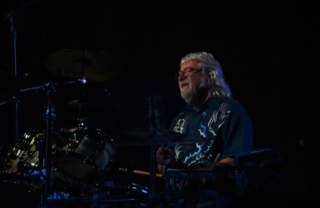
Graeme Charles Edge is an English musician, songwriter and poet best known as the drummer, one of the songwriters in the English band the Moody Blues. In addition to his work with the Moody Blues, Edge has worked as the bandleader of his own outfit, the Graeme Edge Band. He has contributed his talents to a variety of other projects throughout his career. In 2018, Edge was inducted into the Rock and Roll Hall of Fame as a member of the Moody Blues.
John Pinder was a New Zealand-born Australian comedy producer and festival director who produced band performances, ran live venues and co-founded three Australian comedy festivals, including Melbourne International Comedy Festival and Circus Oz.
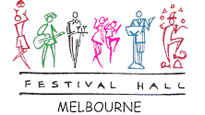
Festival Hall is a historic concert and sporting venue located at 300 Dudley Street, West Melbourne, Victoria. It is one of Melbourne's larger concert venues and has hosted a variety of local and international acts over many years.
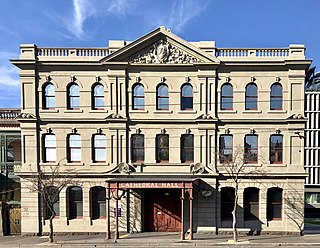
Central Hall is a building that stands at the end of Brunswick Street in Fitzroy, Melbourne, Australia. This structure today serves as a centrepiece of Australian Catholic University's St. Patrick's Campus. It once held a similar role within Melbourne’s Roman Catholic community, from the time the hall and adjoining clubrooms were opened in 1904.
The Deakins were an Australian rock group which formed in 1963. This was the era of the local version of beat music; which included 1960s garage rock, proto-punk and pop. Their initial line-up included, Jeff W Donoghue on bass guitar, Ian Kinkead on drums, Bob Millar and Gary Schober on guitars. The later, Deakins 'trio' released two singles in 1966, "Tonight You're Gonna Fall in Love with Me" and "Take Me for a Little While", via GO!!. The band regularly appeared on the related TV pop music weekly series, The Go!! Show, and on daily weekday show, Kommotion, both broadcast by ATV-0. The Deakins disbanded in 1973.

Ayers Rock were an Australian rock band which formed in August 1973. Ray Burton, Mark Kennedy (drums), and Duncan McGuire (bass), members of Leo de Castro and Friends, left to form the eponymous trio of Burton, McGuire & Kennedy. They added a guitarist, Jimmy Doyle, changed their name to Ayers Rock and invited Col Loughnan to join. The group signed with independent label Mushroom Records in December 1973. Burton left the following March, and was replaced by Chris Brown. With live appearances, coverage in print media and word of mouth the group had a high national profile despite little radio airplay, and journalists praised their musicianship, music, and live energy.
Daddy Cool is an Australian rock band formed in Melbourne, Victoria in 1970 with the original line-up of Wayne Duncan, Ross Hannaford, Ross Wilson and Gary Young. Their debut single "Eagle Rock" was released in May 1971 and stayed at number 1 on the Australian singles chart for ten weeks. Their debut July 1971 LP Daddy Who? Daddy Cool also reached number 1 and became the first Australian album to sell more than 100,000 copies. Their name is thought to have come from the 1957 song "Daddy Cool" by US rock group The Rays. Daddy Cool included their version on Daddy Who? Daddy Cool.
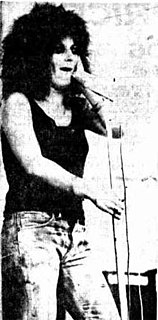
Wendy June Saddington also known as Gandharvika Dasi was an Australian blues, soul and jazz singer, and was in the bands Chain, Copperwine and the Wendy Saddington Band. She wrote for teen pop newspaper Go-Set from September 1969 to September 1970 as an agony aunt in her weekly "Takes Care of Business" column, and as a feature writer. Saddington had Top 30 chart success with her 1972 solo single "Looking Through a Window", which was written and produced by Billy Thorpe and Warren Morgan of the Aztecs. After adopting Krishna Consciousness in the 1970s she took the name Gandharvika Dasi. In March 2013 she was diagnosed with oesophageal cancer, and died on 21 June, aged 63.
A Music Victoria study finds Melbourne hosts 62,000 live concerts annually, making it one of the live music capitals of the world. Victoria is host to more than three times the live performance national average, making it the live music capital of the country. Melbourne is host to more music venues per capita than Austin, Texas.
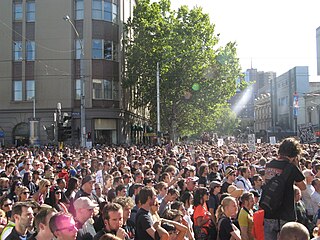
The 2010 Melbourne live music rally, was a public rally held on 23 February 2010, in the central business district (CBD) of Melbourne, Australia. The rally was an act of protest against effects of liquor licensing laws on live music venues in the city. Attendance was estimated at 10,000 to 20,000 by the Australian Broadcasting Commission (ABC).
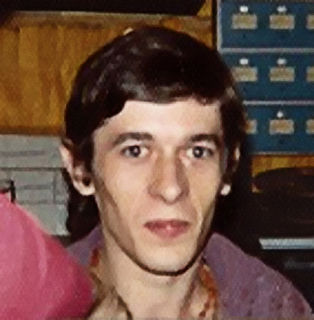
Mark Kennedy is an Australian musician who has been the drummer for several artists including Spectrum (1969–70), Doug Parkinson in Focus (1971), Leo de Castro (1971–73), Ayers Rock (1973–76), Marcia Hines (1976–83), Men at Work (1985), Renée Geyer and Jimmy Barnes (2005).
Wayne Ian Duncan was an Australian rock musician. In 1970 he was a founding member of the doo-wop band, Daddy Cool, providing bass guitar and backing vocals. They were inducted into the ARIA Hall of Fame in 2006. During his career he had also been a member of the Rondells, Sons of the Vegetal Mother, Gary Young's Hot Dog, Jane Clifton and the Go Go Boys, the Black Sorrows, and the Hornets. In late November 2016 Duncan had a stroke and died a week later, he was survived by his domestic partner, Anne, and by two children. According to Australian music journalist, Ian McFarlane, "Duncan was never a sedate bassist. One only has to listen to some of the latter-day DC material... to hear how inventive his playing could be."
